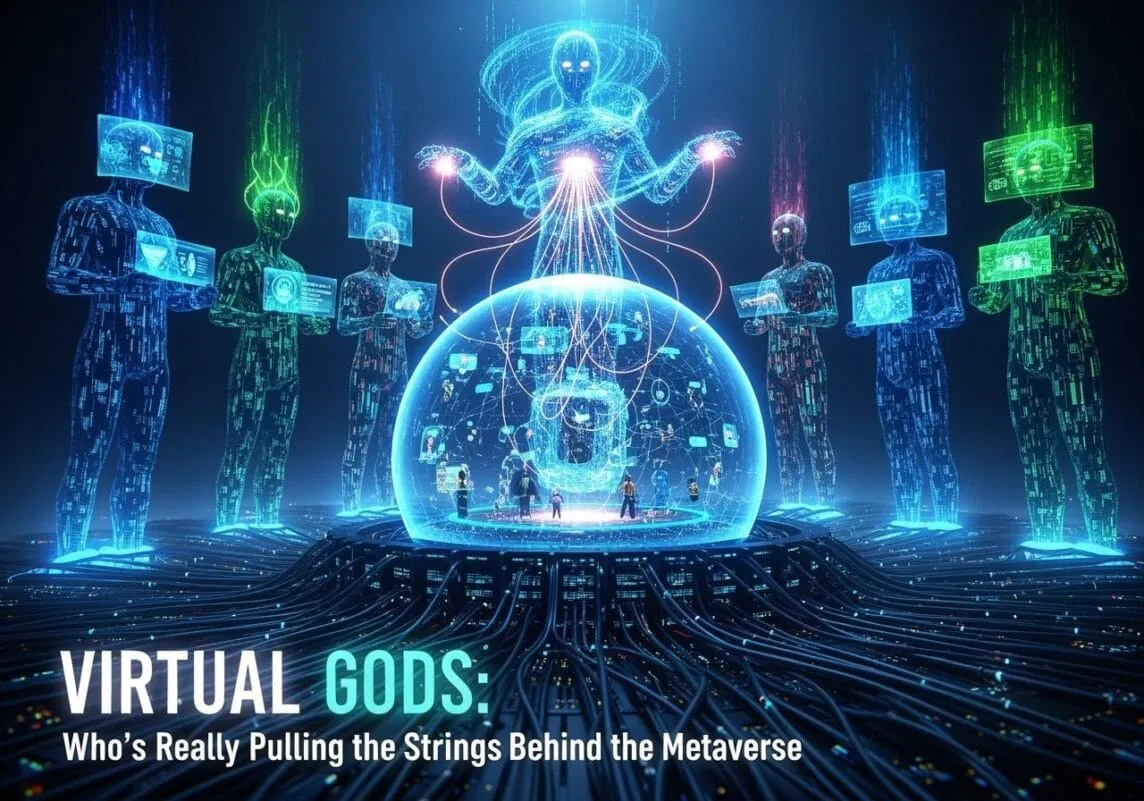Spoiler: It’s not your avatar with the neon mohawk and dragon wings calling the shots—it’s the same handful of tech titans who already own your search history, shopping cart, and late-night doom scroll.
Welcome to the Metaverse, a digital Disneyland where the rides look shiny, but the house still takes the cut. Let’s yank back the velvet curtain and see which corporate deities are scripting our pixel-perfect futures.
Eager for more AI insights? Check out “AI in Schools: The Future We Want vs. Reality We Face” →
- Digital Landlords: A few mega-platforms manufacture artificial scarcity, flipping pixel plots for yacht prices.
- Surveillance Deluxe: Eye-tracking and haptics turn every glance into ad fuel—privacy RIP.
- Pay-to-Exist: Subscriptions, microtransactions, and repo bots ensure the gods keep earning while users keep grinding.
The Land Barons of Nowhere
Real estate in infinity shouldn’t be scarce, right? Yet somehow Parcels #1–10,000 are already “sold” to early investors with more crypto than common sense. Behind that artificial scarcity sits a boardroom of suits minting digital dirt like it’s beachfront property. Why build a fair, open virtual world when you can jack prices and charge monthly “maintenance” on a plot that doesn’t even have gravity?
Example: A single 16×16-meter square in “Prime Genesis City” sells for $25,000 in ETH—meanwhile, the devs haven’t finished texturing the sidewalks. But hey, “Location, location, location”… even if the neighborhood is literally ones and zeros.
Adtech’s New Playground
If Web 2 was a mild invasion of your privacy, the Metaverse is a full-scale annexation. Eye-tracking VR headsets measure how long you stare at a billboard. Haptic gloves log your heart rate when you handle a sponsored energy drink. That data rockets back to marketing servers faster than you can say “targeted dopamine loop.”
Scenario: You’re window-shopping for a virtual jacket. Seconds later, your real-world inbox pings with a coupon for a matching hoodie—plus a subtle upsell on therapy because your biometric stress score spiked at the checkout screen. Helpful… or haunting? Doesn’t matter; the algorithm already A/B-tested the outcome.
Subscription Hell, But Make It 3-D
Power-ups, premium skins, pay-per-teleport—every step is a microtransaction masquerading as “enhanced immersion.” Remember when you bought a game once and just played it? Cute. Now you’ll subscribe to a “Gold Access Pass” that lets you sit on virtual furniture without ads.
Trend Watch: Fintech firms are bundling “metaverse credit lines” so you can finance that VR yacht you’ll never sail. Miss a payment? Repo bots arrive, strip your avatar down to default textures, and haul away your polygon yacht in front of your pixel neighbors. Brutal—and weirdly entertaining.
Algorithmic Gods & Digital Serfs
In theory, blockchains should democratize ownership. In practice, whoever controls the platform code decides the economic physics. They tweak scarcity dials, adjust royalty fees, and can ban you faster than a Twitter slap fight—all under the gentle guise of “community guidelines.”
Power Move: A platform changes its creator-royalty policy overnight. Suddenly, NFT artists see revenues vanish, while the marketplace takes a bigger cut. Protest all you want on Discord; the gods simply patch the server and log off.
The Cult of Infinite Content
Procedural worlds promise endless exploration—a cosmic buffet of auto-generated quests and loot. Sounds great until you realize the algorithm is just recombining the same five dungeon tiles. You grind the same fortress 800 times, chasing a legendary sword that’s basically a recolored spoon. Why? Because engagement metrics > originality.
Player Bureaucracy: Event quests tied to brand sponsorships (“Slay the Mountain Dew Dragon!”). Complete them or your XP progression stalls. Freedom, but with product placement.
Final Boss: Reality Check
The Metaverse markets itself as a blank canvas for human imagination. In practice, it’s a gilded cage built by corporations wearing VR headsets shaped like halos. They aren’t creating new gods—they’re just upgrading the old monopolies to 4K resolution and surround sound.
So before you mortgage your dignity for a penthouse in pixel-paradise, ask: who sets the rules, and who rewrites them when you finally level up? Worship carefully—digital deities run patch notes on a whim, and nothing says “divine wrath” like having your virtual mansion downgraded to a starter cube overnight.



